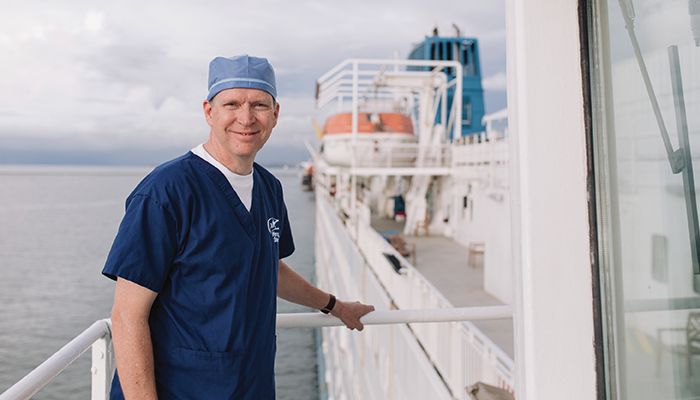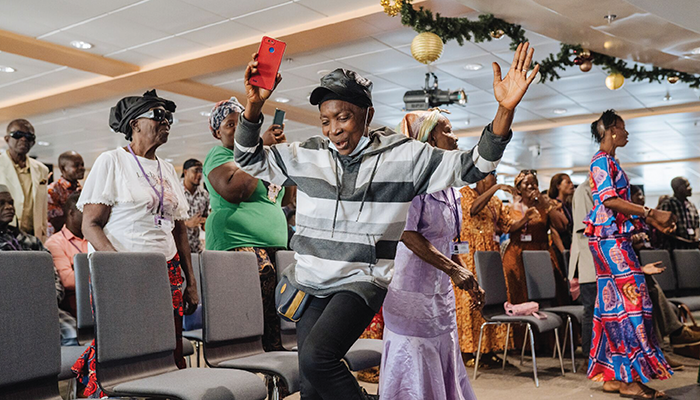
Credit: Image supplied by John Seddon
Though there has been economic growth in many of the 46 countries encompassing Sub-Saharan Africa over the last few decades (including a surge period in the early 2000s dubbed “Africa Rising” by economists), it has not translated into a significant reduction in poverty. One factor playing a major part in this disparity is said to be substandard “governance quality” in countries such as Nigeria, Madagascar, Eritrea, and Zimbabwe; indeed, extreme poverty continues to affect the daily lives of people from these countries.
The World Bank estimates that approximately 69 percent of the continent’s population lives on the equivalent of less than £2 per day, making Africa one of the poorest places in the world. Thus, vulnerable individuals are unable to afford the basic necessities, much less have access to quality and affordable healthcare (and eye care).
The aptly named Global Mercy – a hospital ship currently docked at Freetown (the port city of Sierra Leone) – is one of two vessels belonging to Mercy Ships, an international charity attempting to tackle this issue of poverty head-on. At 37,000 tons, Global Mercy is the world’s largest purpose-built hospital ship, comprising six operating rooms, a 682-seat auditorium, a gym, a café, a shop, and even a library for its 950-strong crew.
Since 1990, faith-based Mercy Ships has been conducting field services across 14 African countries, many of which are ranked by the United Nations Development index as some of the least developed in the world. The charity deploys its fully equipped hospital ships along the African coastal ports to provide free health care – including cataract surgery – for those unable to afford or access these services elsewhere. Mercy Ships’ healthcare volunteers – who need at least two years' experience to handle the different types of care needed in Africa – “selflessly provide life-changing surgeries […] as well as strengthen the healthcare infrastructure in the nations we serve,” explains Kimberly Ames, the charity’s recruitment manager.
“We look for people who want to make a difference and are eager to learn from others and give back,” Ames continues. One of these professionals is Ralph Crew, an ophthalmologist currently serving on the Global Mercy for his 23rd stint with the charity. Crew tells The Ophthalmologist, “I’ve now served on three ships – The Caribbean Mercy, Africa Mercy, and the Global Mercy.” He adds, “There are many reasons why I volunteer. Initially, I was looking for an organization that would let me bring ophthalmology residents. Mercy Ships has first-class equipment – the operating microscopes are better than I use in the US – and is very safe. Safety was an important consideration to the residency programs I worked with, and they very much wanted to expand their residents’ world view.”

Credit: Image supplied by Abigail Beinetti
Crew became involved in Mercy Ships when his colleague took him to a reception for the charity at an American Academy of Ophthalmology meeting in the 1990s. He signed up to join the Caribbean Mercy as a volunteer ophthalmologist the next winter. “The ship had only one operating room for cataract surgery, and we were trying to do the most modern of techniques – phacoemulsification,” he explains. “On the dense cataracts we were exposed to, that [made things] very difficult.”
Today, however, Mercy Ships can perform manual small-incision cataract surgery (MSICS) for dense cataracts, and ophthalmic volunteers now instruct local surgeons on how to perform the procedure. “I’ve taken about 20 residents to serve on Mercy Ships over the past 25 years,” says Crew proudly. “Most have learned MSICs, which will allow them to participate in future mission trips. I’ve also assisted in training many African surgeons in MSICs.”

Credit: Image supplied by Shawn Thompson
Celebration of Sight is an event held on Mercy Ships’ vessels to bring patients who have received successful cataract surgery together with staff to celebrate their restored vision. It’s a “joyful time of music and dancing, which [reminds] us of the power of our work together,” says Ames. But where there is cause for celebration on an individual level, there is still much work to be done. “Despite our impact, many more children and families are waiting,” she adds. To attract future volunteers to their cause, Mercy Ships is spotlighting the positive impact of its work. “Those who have come to Africa and experienced volunteering describe it as life-changing – and a chance to remember why they were called to provide care for others to begin with,” says Ames. “The experience of serving gives people the opportunity to immerse themselves in a new culture, work alongside professionals from as many as 66 other nations, and experience Africa – all while knowing they are truly having an impact. Our future involves passionate volunteers from around the world, committed to restoring sight for the blind and changing lives for people in great need.”
The charity is currently offering a host of volunteer roles in their ophthalmic team, including surgeons, clinical team coordinators, therapeutic optometrists, non-surgeon ophthalmologists, and administrative assistants. If this sounds like something you might be interested in, click here.

Credit: Image supplied by Abigail Beinetti
